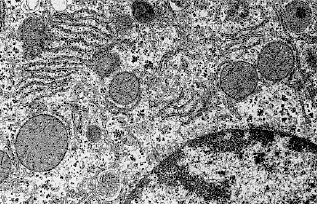
Electron micrograph of rat liver cells. Part of the nucleus is in the right lower corner. Circular objects are mitochondria.
Eukaryotes are complex, nucleated cells, that contain internal organelles (e.g. mitochondria, lysozomes, centrioles and chloroplasts), specialized "organs" that often contain their own DNA. They thus distinguish themselves from the much smaller and simpler prokaryotes, cells without internal structure. Bacteria are prokaryotes, while protozoans, like the Amoeba, and the cells of fungi, plants and animals are eukaryotes. According to the endosymbiotic theory of Lynn Margulis, organelles originated as smaller bacteria-like cells that were engulfed by a larger cell and continued to live inside that cell, using its products while producing some other products in return. Thus, these bacteria lived in internal symbiosis (endosymbiosis) with the encompassing cell. Mitochondria are bacteria that became specialized as energy producers.

Electron micrograph of rat liver cells. Part of the nucleus is in the right lower corner. Circular objects are mitochondria.
Mis à jour le 01/04/2016 ![]() pratclif.com
pratclif.com